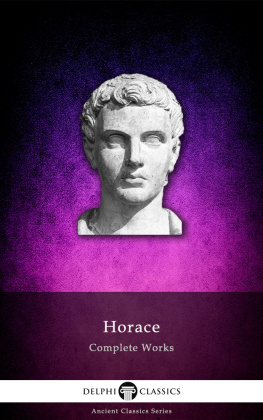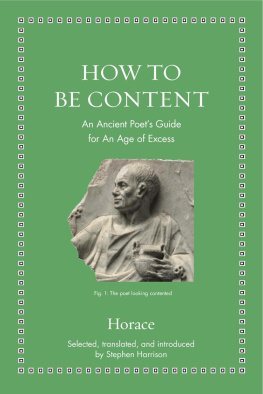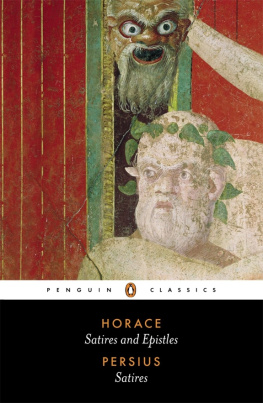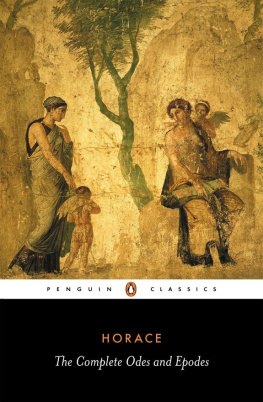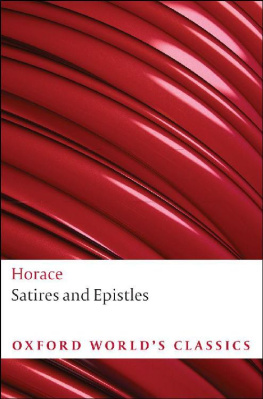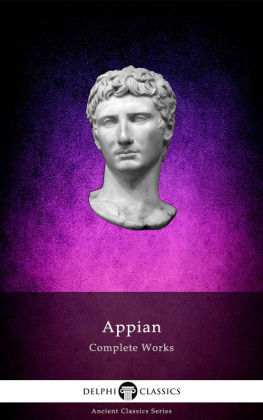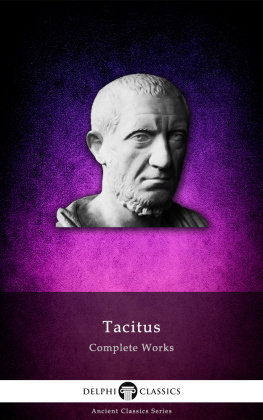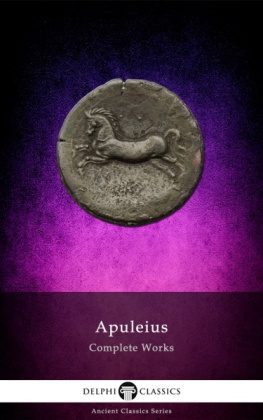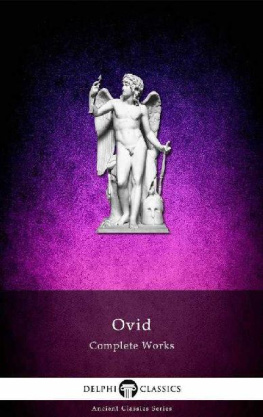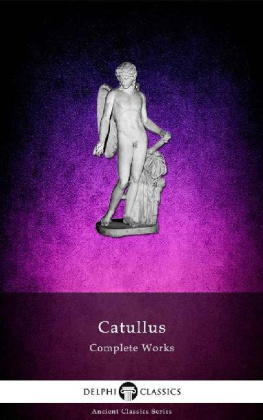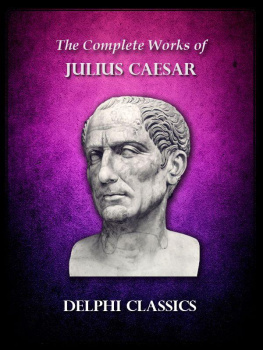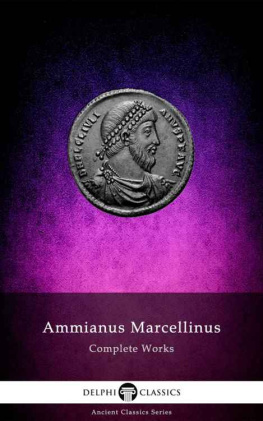
The Complete Works of
HORACE
(65 BC8 BC)

Contents

Delphi Classics 2013
Version 1

The Complete Works of
HORACE

By Delphi Classics, 2013
The Translations

The site of ancient Venusia, near modern Venosa, a town and comune in the province of Potenza, in the Southern Italian region of Basilicata Horaces birthplace

The statue of Horace in Venosa
SATIRES (PROSE)

Translated by C. Smart
Horaces father was a slave for at least part of his life, but he was evidently a man of strong abilities and managed to gain his freedom and improve his social position. The father spent a small fortune on his sons education, eventually accompanying him to Rome to oversee his schooling and moral development. Horace left Rome, possibly after his fathers death, and continued his formal education in Athens, the great centre of learning in the ancient world, where he arrived at nineteen years of age, enrolling in The Academy. Founded by Plato, The Academy was now dominated by Epicureans and Stoics, whose theories and practises made a great impression on the young man from humble Venusia. Meanwhile, he socialised with the elite of Roman youth, such as Marcus, the idle son of Cicero, and the Pompeius to whom he later addressed a now famous ode. It was in Athens too that he probably acquired familiarity with the ancient tradition of Greek lyric poetry, which at that time largely was favoured by grammarians and academic specialists and was largely neglected in Rome.
In the meantime, Romes chaotic troubles following the assassination of Julius Caesar were about to disrupt the world around him. Marcus Junius Brutus came to Athens seeking support for a republican cause. Brutus was fted around town in grand receptions and he made a point of attending academic lectures, whilst recruiting supporters among the impressionable young men studying there, including Horace. An educated young Roman could begin military service high in the ranks and Horace was made tribunus militum, one of six senior officers of a typical legion, a post usually reserved for men of senatorial or equestrian rank and which would have inspired jealousy among his well-born confederates. Horace learned the basics of military life while on the march, particularly in the wilds of northern Greece, whose rugged scenery inspired some of his later poems. It was there in 42 BC that Octavian, later to become the Emperor Augustus, and his associate Mark Antony crushed the republican forces at the Battle of Philippi. Horace later recorded it as a day of embarrassment for himself, when he fled without his shield allowing him to identify himself with some famous Greek poets Alcaeus and Archilochus that had long ago abandoned their shields in battle.
Octavian offered an early amnesty to his opponents and Horace quickly accepted the truce. On returning to Italy, he was confronted with yet another loss: his fathers estate in Venusia was one of many throughout Italy to be confiscated for the settlement of veterans. Horace later claimed that he was reduced to poverty and this led him to try his hand at poetry, though in truth poetry rarely offered a lucrative trade. Meanwhile, Horace obtained the sinecure of scriba quaestorius, a civil service position at the aerarium or Treasury, profitable enough to be purchased even by members of the ordo equester and not very demanding in its work-load, since tasks could be delegated to scribae or permanent clerks. It was about this time that he began writing his Satires , which would become his first published collection of poems.
The Satires are composed as dactylic hexameters exploring the secrets of human happiness and literary perfection. Published circa 35 BC, the first book of satires helped establish Horace as one of the great poetic talents of the Augustan Age. The second book was published five years later, following up on the immense popularity of the first book.
In the Satires Horace employs an Epicurean and essentially Greek philosophy, blended with Roman good sense, to convince his readers of the futility of their vain ambitions and corporal desires. As an alternative, he proposes a life that is based on the Greek philosophical ideals of autarkeia (inner self-sufficiency) and metriotes (moderation or adhering to the Just Mean). The second book of the Satires goes on to address the fundamental question of Greek Hellenistic philosophy and the search for a happy and contented life. In contrast to the first book, however, many of the poems in the second book are dialogues in which the poet allows a series of pseudo-philosophers, such the bankrupt art-dealer turned Stoic philosopher Damasippus, the peasant Ofellus, the mythical seer Teiresias, and the poets own slave Dama, to espouse their philosophy of life, in satiric contrast to that of the narrator.
Horaces direct predecessor as writer of satires was Lucilius, whose works inspired him to adopt the use of the hexameter, the conversational and sometimes even prosaic tone of his poetry and the tradition of personal attack. However, in contrast to Lucilius, the victims of Horaces mockery are not members of the nobility, but overly ambitious freedmen, anonymous misers, courtesans, street philosophers, hired buffoons and inept poets. In accordance with the Epicurean principle Lathe biosas (Live unnoticed), Horace consciously does not get involved in the complicated politics of his times, but advocates instead a life that focuses on individual happiness and virtue.

The plain of Philippi, from which Horace fled in battle

Gaius Lucilius (c.160 BC 103/2 BC), the earliest Roman satirist, whose writings only survive in fragments, was a Roman citizen of the equestrian class, born at Suessa Aurunca in Campania. His satires directly inspired the first published works of Horace.
CONTENTS

Horace reads before Maecenas by Fyodor Bronnikov
BOOK I.
SATIRE I.
That all, but especially the covetous, think their own condition the hardest .
How comes it to pass, Maecenas, that no one lives content with his condition, whether reason gave it him, or chance threw it in his way [but] praises those who follow different pursuits? O happy merchants! says the soldier, oppressed with years, and now broken down in his limbs through excess of labor. On the other side, the merchant, when the south winds toss his ship [cries], Warfare is preferable; for why? the engagement is begun, and in an instant there comes a speedy death or a joyful victory. The lawyer praises the farmers state when the client knocks at his door by cock-crow. He who, having entered into a recognizance, is dragged from the country into the city, cries, Those only are happy who live in the city. The other instances of this kind (they are so numerous) would weary out the loquacious Fabius; not to keep you in suspense, hear to what an issue I will bring the matter. If any god should say, Lo! I will effect what you desire: you, that were just now a soldier, shall be a merchant; you, lately a lawyer [shall be] a farmer. Do ye depart one way, and ye another, having exchanged the parts [you are to act] in life. How now! why do you stand? They are unwilling; and yet it is in their power to be happy. What reason can be assigned, but that Jupiter should deservedly distend both his cheeks in indignation, and declare that for the future he will not be so indulgent as to lend an ear to their prayers? But further, that I may not run over this in a laughing manner, like those [who treat] on ludicrous subjects (though what hinders one being merry, while telling the truth? as good-natured teachers at first give cakes to their boys, that they may be willing to learn their first rudiments: railery, however, apart, let us investigate serious matters). He that turns the heavy glebe with the hard ploughshare, this fraudulent tavern-keeper, the soldier, and the sailors, who dauntless run through every sea, profess that they endure toil with this intention, that as old men they may retire into a secure resting place, when once they have gotten together a sufficient provision.
Next page
